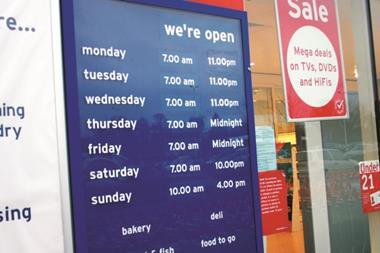The government’s analysis of its recent consultation on Sunday trading revealed a lack of appetite for relaxing the regulations, even among large grocery stores, C-Store can reveal.
Relaxing the Sunday trading laws would also result in the “redirection of consumer spend from small retailers” rather than an overall growth in spending, it concluded in response to last year’s Red Tape Challenge consultation.
In its analysis, released to C-Store following a Freedom of Information request, the government confirmed that the current regime represented a “reasonable compromise, meeting in part at least the wishes of all the various interest parties”. Changing the current six-hour trading limit for large stores was “not supported by a convincing economic case and would clearly be controversial given the strength of feeling and arguments in favour of retention,” it added.
However, ministers recently announced plans to suspend Sunday trading laws during the eight-week duration of the Olympics. “By suspending Sunday trading laws in England and Wales, on a temporary basis, we will provide a boost in sales and employment,” said business minister Mark Prisk.
The government’s analysis of the Sunday trading consultation noted strong support from shopworkers and small businesses for retaining the laws. Large retailers did not respond individually, but “from other sources we understand that opinion is divided among large grocery stores”.
Responses from individuals were divided, with some favouring freedom to shop at any time, and some citing religious or social reasons for maintaining Sunday trading rules.
Association of Convenience Stores chief executive James Lowman said: “This proves that whenever policymakers have looked at changing Sunday trading legislation there has always been lots of opposition and very little support.
“It’s outrageous that the government is aiming to liberalise Sunday trading for the Olympics without consultation and we’re grateful that C-Store has uncovered this evidence that we will be using in our lobbying.”
The issue is being debated in the Lords today, and is due in the Commons next week.


























No comments yet